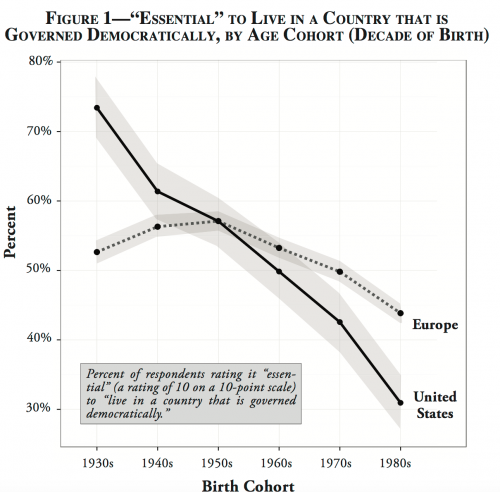Stuart Schneiderman links to an article by a therapist who has a lot of experience working with millennials…
On any given day, a handful of millennials will come into my office and express their most pressing concerns: “I’m worried I’ll never make enough money to retire.” “I feel like a failure.” “I don’t know if I’m setting up my adult life the right way.”
But the complaint they bring up the most? “I have too many choices and I can’t decide what to do. What if I make the wrong choice?”
Now, I think that ‘generational’ explanations of social phenomena should be taken with multiple carloads of salt: individual differences are IMO much more significant than generational differences. And the people this therapist has been working with are not just millennials, but San Francisco area millennials. Still, this pushback against having too many choices is unpleasantly reminiscent of the young German who was quoted as saying, shortly before the outbreak of World War II: “We Germans are so happy. We are free of freedom.”
To the extent that this phenomenon is real and is general, I would suspect several factors of being implicated. Specifically:
***The focus on “self-esteem building”, which seems to have the effect of producing people whose self-esteem is brittle and cannot withstand failure or contradiction.
***The trend toward child-raising in organized group settings…usually for-profit organized group settings…which may tend to create more orientation toward group conformity and less individuality than the more traditional “artisanal” at-home child raising.
***Increasing years of schooling, which can delay growing up. Peter Drucker observed that when you’re in school, it’s all about you, unlike the working world where it’s all about doing things that are of value to others. (FWIW, Drucker also said he observed striking levels of immaturity in many medical students because of this factor.)
Anecdotal evidence only, but I have observed that people with many years of education–specifically, people with graduate degrees–are often reluctant to try new approaches to things. Whether it’s an MBA or a Masters in Computer Science, they often want to stick close to the paradigms they were given in the classroom. It would be interesting for someone to systematically study the relationship between education and mental rigidity.
***Finally, there is general social change and disorganization. Stuart writes: “Back in the day, when society was organized and where people understood their duties and obligations, these decisions were far less difficult and far less onerous”…the decisions were less onerous, but of course many people felt constrained–and often were constrained–in ways they did not want to be.
Someone writing in an aviation magazine observed that “if you do anything with your airplane that is not consistent with the Pilot’s Operating Handbook, then you are a test pilot.” In a society, the equivalent of the POH is the aggregate of laws, customs, and implicit expectations that guide behavior. There is no doubt that any society’s POH needs constant updating, and sometime major changes–but when major changes do occur, they will be disorienting to many people, and it seems that a nontrivial number of them will react by wishing for more constraints.
Some people thrive as test pilots–either of aircraft or in a societal setting–but many do not, including many people who would be perfectly adequate or even excellent pilots in a more-defined setting.
One of the major problems we have in America today is that so many of the people who have taken it upon themselves to totally rewrite the societal POH are people who are lacking in practical experience, historical knowledge, and ‘skin in the game.’ To continue the aviation analogy, it is as if a POH was rewritten by people who had no background in aeronautical engineering, no experience or minimal experience in flying aircraft, and (in many cases) absolutely no intent of either flying or flying in those aircraft being operated in conformity with their documents.
What proportion of the people in a society can lose belief in the value of individual freedom before they destroy that freedom for everyone, including those who do value it, and how close are we to that point?
